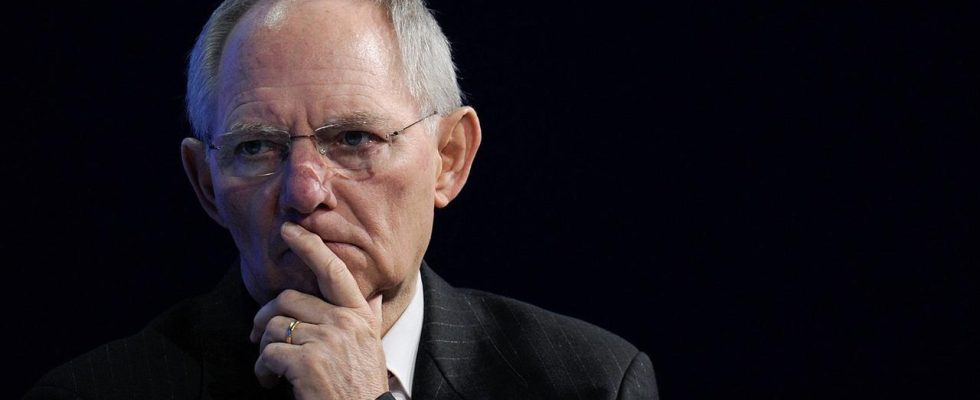interview
Schäuble was a veteran of the Christian Democrats. His political legacy is remarkable, says political scientist Lietzmann in an interview. Today’s politicians could learn from his selfless, often determined toughness and clarity.
tagesschau.de: Wolfgang Schäuble sat in parliament longer than anyone before him. What political legacy does he leave behind?
Hans Joachim Lietzmann: It’s important to see: Schäuble is essentially a child of the 1960s. This means that he came to the Bundestag from the turbulence of the new beginning of the Federal Republic and made extraordinary proposals and took positions in a prominent place and very succinctly – to the annoyance of both his friends and his opponents.
Very conservative in structure, but also extremely innovative and creative and much more self-critical and ironic than we otherwise know in parliamentary business – despite all the toughness that he has shown in this business or in this activity.
tagesschau.de: How did he manage to get to such high positions?
Lietzmann: He is a lawyer and knows the structures. He comes from a political family. His father was already politically active, and his brothers were too. It was important to him that if he took part in politics, he could do so with all his power. He was head of the Chancellery and was interior minister several times. But he also campaigned for black-green politics very early on. He created the debt brake. And during his time as President of the Bundestag – far away from government offices – he was very committed to the citizens’ councils.
To person
Hans Joachim Lietzmann is a political scientist. He has headed the Institute for Democracy and Participation Research at the University of Wuppertal since 2004. Since 2006 he has been scientific director of the Institute for European Citizenship Politics – Citizenship Politics in Europe. His research interests include democratic participation processes in Germany and the EU.
tagesschau.de: Why was it never enough to become Federal Chancellor?
Lietzmann: He had a very dominant person like Helmut Kohl standing in his way, who spread his elbows a lot and didn’t let him become his successor. And when the Kohl era ended with the big row, the CDU’s illegal donation practice that had lasted for years – not to say decades – was exposed. As one of Kohl’s closest confidants, as head of the Chancellery, as parliamentary group leader, he was partly a prisoner.
Angela Merkel was interested in becoming chancellor herself. And the fact that he was unable to become Federal President has a lot to do with consideration for the FDP and also the SPD, who put their own candidates in the foreground.
But I think he played an important role as President of the Bundestag. This is a parliamentary work, and therefore also a very democratic work. And he took on this as a completely new task with a lot of verve and a lot of charisma.
tagesschau.de: How do you define his role in the donation scandal?
Lietzmann: The exact role that Wolfgang Schäuble played in accepting donations, just like that of Helmut Kohl, has never really been clarified. The assurance that the CDU never allowed itself to be corrupted by these donations cannot hide the fact that these donations were against the law on donations to parties.
It’s a big gray area, a lot of illegal things went on there and I don’t know exactly what his role was. But he acknowledged this as a mistake and accepted the break in his political career as a bitter consequence, which he deeply regretted.
German politican
A life for politics
tagesschau.de: Another drastic experience was the assassination attempt on him. How much did that influence his political work afterwards?
Lietzmann: In his work as Interior Minister, he really advocated very drastic and extraordinary measures, such as shooting down civilian aircraft if this would potentially result in an assassination attempt. That was after the attack on September 11, 2001. There was this debate.
He has advocated very, very drastic restrictions on data protection. Other interior ministers like Otto Schily have also done this. But I don’t want to rule out the possibility that my own biographical experience with such an attack also led to this harshness or determination.
tagesschau.de: What would you say was Schäuble’s greatest achievement?
Lietzmann: I think the greatest achievement was this incredible continuity. He was always innovative and, at least in recent years, had a self-deprecating and self-critical view of the exercise of power, which for a long time was very pragmatic and very stubborn and which in the end was very principled and democratic. These are two facets, and he has put all his experience, his determination and all his irony at the service of both facets.
This is a very remarkable achievement to do this with this selfless, self-determined toughness and clarity: on the one hand, determination and concentration and at the same time always finding distance from yourself is definitely exemplary for many politicians who are in are active in the present.
Romy Hiller conducted the interview for tagesschau24. It has been edited and shortened for the written version.

